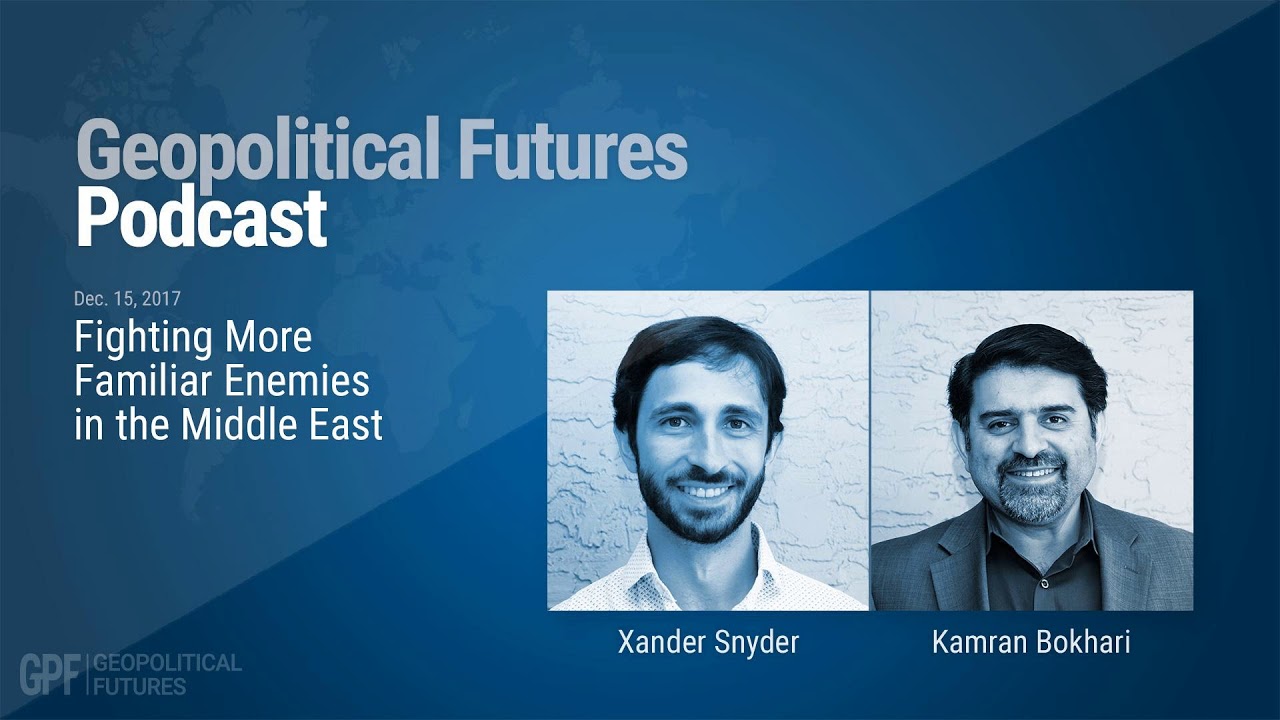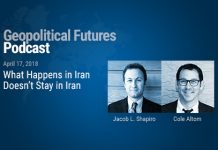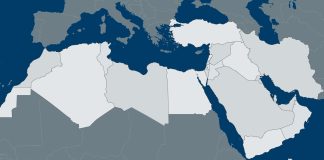Xander Snyder: Hi and welcome to the Geopolitical Futures podcast. I’m Xander Snyder and today I’m joined by Kamran Bokhari and we’re going to try to untangle the web that has become the Middle East for you a little bit.
But first, Kamran why don’t we start with something we picked up this morning? We saw that Qatar which was alienated by some of the Gulf states mid this year is no collaborating with the Iranian backed Houthis in Yemen and were helping get a new branch of Al Jazeera set up. How does Qatar play into Yemen and then how does that fit into the larger picture?
Kamran Bokhari: So Xander, when it comes to Qatar it should be remembered that originally the Saudi-led coalition did involve the Qataris. They were a component within the Saudi led military coalition. They participated in the conflict. But at one point, their differences with Saudi Arabia and the UAE became so immense that not only did they you know fall out of formation in Yemen, but it created a massive antagonism between Doha and Riyadh.
And so, Qatar has been shut out from Yemen. And one of the things that the Saudis and their allies did was to isolate and lay siege to or attempt to lay siege to Qatar, isolate it from the region, do as big of a blockade, as effective of a blockade as possible though that hasn’t worked and we’ve written about it.
But I think that in Yemen, there are two things that Qataris are looking for. One is that A: they want to be able to go back to they are, if you will, viewing the conflict from a very different lens than the Saudis and the others. They see the Houthis as having more staying power for lack of a better term than their opponents. They look at their opponents and they say they are divided and they’re not an effective force.
And it’s almost as if the Saudis are just sort of dragging all of them along to maintain an effective counter to the Houthis. And here it’s important to note that, the Qataris don’t see or at least don’t view the Houthis as a threat necessarily the way the Saudis do. Definitely Qatar does not want Iran dominating the region. And here the Iranians are the patrons of the Houthis, that the Saudis are trying to combat in Yemen and unsuccessfully so far.
And so, but they take for lack of a better term, a more realistic view as far as ok this Saudi policy of military confrontation and trying to force the Houthi hand is becoming very, very costly. It is undermining the stability of the regional fabric. And it’s more detrimental. And in fact, they view it as the more this war goes on, the more likely that Iran will have more room to maneuver and exploit the internal Arab weakness.
So maybe then we can use the current situation in Yemen, as an opportunity to step back and look at the different areas where Iranian power has been expanding over the last couple of years. So in Yemen, if you’re not familiar with sort of the current state of play, there’s a civil war there essentially between the Iranian backed Houthis as Kamran described. And the Saudi Arabian backed government forces and that includes troop contributions by the UAE as well.
Now Yemen’s just one area where this sort of proxy conflict is going on. Another area that of course has seen quite a bunch of expansion of Iranian power in the last couple years is Syria. And in a related way Iraq. And then there is Lebanon. So how do these three places Kamran, fit into the bigger picture?
KB: So as you rightly point out Xander, what we have is a situation where these are arenas of what I call the geopolitical sectarian struggle between the Iran-led Shia block and the Saudi-led Sunni-Arab camp, and these are various theaters.
Now from a net strategic point of view, Iran has the upper hand and that’s because Iraq has fallen into the Iranian orbit over the years. It appeared in 2011 that there was an opportunity, an opportunity of a lifetime for the Saudis to try and punch a hole in Iran’s growing sphere of influence by toppling the Assad regime in Syria. That not only failed to materialize, it empowered another enemy of the Saudis which is ISIS and other jihadists like al-Qaeda and other forces that don’t see eye to eye with the Saudis.
And so now what we have is that not only has the Assad regime survived, though it’s still a shell of its former self, but nonetheless the Iranian sphere of influence remains intact. And this is very worrying for the Saudis and now the focus of the Saudis is Yemen, because Yemen is their backyard. At the end of the day, they have more or less you know accepted defeat, I’m talking about the Saudis here, in Iraq because demographics work against the Saudis. They’re 65% roughly of all Iraqis are Shiites and their political principles are pro-Iranian factions.
And then there are roughly about you know 15 to 20 percent Kurds and the rest are Sunnis and they are divided and if they were was any power that had any influence over Iraqi Sunnis, it was ISIS. And now after ISIS has been degraded, there is this rush to see who is going lead the Sunnis. And even if and when that happens, a coherent force emerges, it’s still a loss for the Saudis.
Syria does not have a border with Saudi Arabia, therefore there’s very little that the Saudis can to do to affect the course of war in that country. But Yemen sits on their backyard, Yemen is like next door in which the Saudis have long had influence. In fact, I would argue that their way of historically managing Yemen has led to the fragmentation of Yemen, playing tribes off of one another, factions and you know regional forces. And so today’s Yemen is an outcome of that.
And finally, you know it has forced the Saudis to take you know direct military action in that country. Because if the Houthis you know gain the upper hand, then that places Iran in Saudi Arabia’s backyard. Which is an intolerable security threat for Riyadh. So that’s sort of, this is the most permanent condition if you will, to the extent that things are permanent in the Middle East, in the region. But then there are other alliances that are taking places beyond this sort of Saudi camp vs. Iran camp.
XS: I think before we move on past Saudi/Iran, I certainly would be interested to cover a little bit more of what seems to be this third potential area of contention which is in Lebanon. A couple, I think it was a couple weeks ago now, the executive of Lebanon was in Riyadh and resigned. There was a lot of speculation at the time that well this is obviously Saudi pressure and Saudi was trying to create divisions within Lebanon because it’s afraid that Hezbollah which is an Iranian proxy is gonna take more power there. And then later he kind of recalled his resignation. So before we move on from the Saudi/Iran sort of struggle for power, what’s your take on Lebanon?
KB: Lebanon is actually and this is a good question because this is the original battlefield between the Saudis and the Iranians and it goes back to the 1990s. It was a country where Hezbollah emerged as Iran’s premiere regional proxy group. Hezbollah emerged out of the ‘80s and at the same time, it found patrons amongst the Iranians especially after the 1979 revolution that brought the current regime to power. They used the sectarian Shia card but more importantly the ideology of Shia Muslimism promoted by Iran in which clerics have the upper hand in terms of geopolitical power.
And they were able to align a good chunk of Lebanese Shiites under the banner of Hezbollah. Now that development, which was supported by the Iranian regime at the time because the Syrian regime is run by the Alawite minority. Alawites are a heterodox form of Shia Islam and therefore there is a convergence of interests between Damascus and Tehran. And from the Saudi point of view, that was the very first sort of extension of Iranian power across the region.
Now this is an area, Lebanon is an area, where the Saudis have also had their own historical ties. So there are lots of families that are dual citizens of both Lebanon and Saudi Arabia and many of them are elite families, specifically the al-Hariri clan, whose current principal is Prime Minister Saad al-Hariri and he is the son of the longtime former Prime Minister Rafik al-Hariri, who was assassinated by Hezbollah in 2005.
And so there is bad blood there, not just because Iran supported Hezbollah but because of the civil war that went on and that Iran essentially throughout the ‘80s was able to force Saudi Arabia’s hand in accepting a truce in 1989 and called the Taif Accords. They brought an end to fifteen years of civil war in Lebanon in which Christian, Shiite, Sunni, Jew factions were fighting each other and the outcome of that was not favorable for the Saudis.
So they had to accept Hezbollah as a mainstream political force that would not only retain its military wing but also be part of the political fabric, have a presence in the Parliament and even in the Cabinet and that presence has grown over the years since 1990 when the political deal was implemented. And now over the years Hezbollah is essentially, it used to be called the state within the Lebanese state. It would not be an exaggeration to say that Hezbollah is like the core of the Lebanese state anymore. They control the presidency; their ally now is a president who was elected about a year ago.
And the Saudis have really lost influence because the Sunnis are a minority. The rise of ISIS and jihadists in the wake of the Arab Spring have scared off a lot of former Maronite allies, Maronite Christian allies of Saudi Arabia. And so the Saudi camp has weakened and this is something that Saad al-Hariri has acknowledged I think in the last couple of days and he termed it as “the Great Betrayal” or something like that.
So Lebanon is once again a place where the Iranians have the upper hand. And this is sort of the trendline that is extremely disturbing from the Saudi point of view and they have very few tools with which to combat this trendline.
XS: Yeah it really does seem that as Saudi Arabia appears to be declining in power, Iran is accumulating just a better and better position in all of the areas where it can challenge Saudi Arabia. Of course Saudi Arabia is the only other regional power that Iran will have to contend with at some point.
And unlike Saudi Arabia, we expect Turkey to augment its power over time. It has a much more diversified economy, it’s not just dependent on oil, it has a very strong military and yet it seems that up to today, Iran and Turkey and Syria have been cooperating more than they have been clashing. And it seems that Turkey has really first and foremost, at least publicly, been focused on the issue of Kurds in northwest Syria, which sits right on the border with Turkey. What explains Turkey’s focus now on the Kurds rather than Iran? And what will cause this to change in the future Kamran?
KB: You are absolutely right. In many ways and if you look at it from the point of view of Iran, the Iranians do not look at the Saudis as co-equals, they look at them as a weak power whose weakening will allow them to flex their muscles in the region even more so than they already are able to do. But from their point of view, the historical rival that they have is Turkey.
Turkey as you rightly pointed out is a major player. It’s the 16th or the 17th largest economy of the world, it has a NATO class military and you know the Persian and Turkish struggle goes back centuries to the Ottoman empire versus the Safavid Empire in Persia, I mean a competition/conflict that is half a millennium old.
And so definitely from an Iranian point of view, they’re looking at the future where Turkey will emerge as their main counterweight. And they’re trying to prepare for that. And in many ways, things are better today for the Persians, for the Iranians, than they were for the predecessors 500 years ago. Five hundred years ago, it was the Ottoman Turks, a Sunni power that dominated the Arab Islamic world and it was in control of both the Levant and Mesopotamia, i.e., Syria and Iraq, and it had the upper hand against the Persian Empire at the time called the Safavid Empire. And it was confined to southeastern, I’m sorry southwestern Iraq and of course the Persian core that forms modern-day Iran.
Now today the situation is reversed, we don’t have empires. We don’t have any site controlling territory as it used to be in the medieval era, in the pre-modern age of imperial dominions. But what we do have is Iran having a disproportionate amount of influence in both Iraq and Syria, which is unprecedented. And there are reasons for that is because Iran’s current regime has deliberately had a very expansionist foreign policy whereas Turkey historically ever since the fall of the Ottoman Empire and the emergence of the modern Turkish secular republic and it’s you know emergence as a major regional NATO ally. It’s not acted unilaterally, it has not projected power you know in a nationalistic way, much less any other trends national sort of identity whether it is Turkish or whether it is Sunni Islam.
So there you can say that Turkey is behind the curve at this point in time and it has allowed Iran to get a head start in both Iraq and Syria, the two Arab countries that border Turkey and of course as I said earlier demographics help Iran. And so that’s where we are today. And then of course Turkey is going through internal changes since 2002, the current regime of President Recep Erdogan is trying to consolidate power and create a new Turkey which has pan-Turkic ambitions, pan-Islamic ambitions. And in many ways, it is a competitor to Saudi Arabia for leadership for Sunni Islam and the Arab world. And it’s also in competition with groups like ISIS and al-Qaeda who also claim leadership of Sunni Arab or Sunni Arabism if you will and the wider Sunni Islamic world.
And so these are the reasons why Turkey at this point in time, seems to be as they say in the language of cricket, playing in the backfoot. And I think that that is going to change because this is something that Turkey cannot tolerate and it’s only a matter of time when Turkey sorts out its internal problems, be them economic, be them military and especially in the wake of the 2016 summer coup, the ill-fated coup that is in many ways enabling Turkey to become something very different.
So in a matter of time, I think this struggle that we call Saudi versus Iran will morph into a struggle that will be between Turkey and Iran. And one more thing before I end my thought is that at this point in time, Turkey also has to contend with the fact that Russia is aligned with Iran, at least in Syria. And that’s something that the Turks cannot ignore and places further constraints in the Turkish path.
XS: Yeah I want to revisit the point you made on the centuries of conflict between the Safavids and the Ottoman Empire. This is one of those examples where the way in which history intersects with geography can really cast some light on the current situation. So Syria and Iraq as states have for the most part fallen apart and they’re beginning to come back together to the extent that regional powers are holding territory within them.
Now as you mentioned, Syria and Iraq used to be a part of the Ottoman Empire, and the Safavids and the Ottomans fought for like 120 years in a series of wars where one empire would exchange territory back but because the supply lines ran so long for the Ottomans, they couldn’t really hold that territory for a whole long time, so they’d have to retreat in the winter and lose them back and it just went back and forth and back and forth.
But the treaty that ended up settling those series of wars, and I’m forgetting what it’s called right now, set the boundary along the Ottoman Empire and the Safavids that is essentially now the modern-day boundaries of Syria and Iraq and Iran. And the reason for that is as I mentioned in part supply, it’s just a long way from Istanbul to actually wage war against Iran as well as geography because Iran is protected by the Zagros Mountains and some of the passes that the Ottomans had to take to move their military to fight the Safavids was through the Caucasus and that really didn’t leave a whole lot of options and you only had so much time in the year to move the troops through the mountain ranges up there because then it froze.
So I think to look at the current situation is just another stage in what is really a long-standing historical cycle of conflict between the powers that control these two territories.
KB: No, you’re absolutely right. I mean even today and in the future, there are lots of arrestors in the path of the Iranians and the Turks that will prohibit them from directing clashing with each other. A is geography, the Zagros mountains are A: a long way from Turkish supply lines and even if those supply lines could somehow be addressed, it’s still a, if you will, insurmountable terrain that you’d have to contend with if you are the Turks.
And the reverse is true as well. One of the things that limits the Iranians is that A, they are Persians and then on top of that they are Shia. So not only are they the ethnic other, they’re the sectarian religious other as well. So while the Arabs don’t want to be dominated in an ideal world by the Turks, nonetheless they share the same Sunni Islam with the Turks so there’s a bit of, if you will, brotherhood there which isn’t the case for the Iranians.
So the Iranians can at best hope to be able to take advantage of a divided Sunni Arab landscape and have proxies. The Shia are a minority in the region, that reality is not about to change. Demographics are stark, some 20 percent of all Muslims in the region and even beyond the region are Shia. Most of the Muslims are Sunnis of one denomination or the other and so these are things that are not lost on the Iranians.
So they are just trying to make the best of what they can given the circumstances. They know that they have you know, they will if they have not already, peaked in terms of what they can establish. They don’t have the resources. The mountains that protect them also inhibit their own supply lines and we’ve already discussed demography.
So I think that there is going to be a, you know some form of equilibrium that will emerge between these two sides. And here I want to take a couple of minutes also to mention Israel. Is that Israel is a major arrestor in the path of the Iranians. It is not in the Israeli interest that Iran should be able to exploit the problems of the Arab world.
And this is why we see Israel working closely with Egypt, with whom it has diplomatic relations dating back to the late ’70, and Jordan and now Saudi Arabia of all countries that has at least publicly been opposed to Israel but behind the scenes has had a relationship over the years and decades. And now that relationship is becoming open because the Saudis are without options and the Israelis need to make sure that the Iranian attempt to exploit the Arab chaos can be contained.
And here when it comes to Iran, you see a convergence of interests between not just the Israelis and the Arabs but also more importantly Turkey and Israel that also enjoy diplomatic relations, there’s a bit of conflict and competition there that has surfaced in the last decade or so. But nonetheless when it comes to Iran, it’s neither in the Israeli nor in the Turkish interest to see it expand much and there’s room for cooperation. Iran knows that.
So I don’t think any one side is going to be able to overwhelm the other. And this is going to mean continuous struggle and warfare by proxy and other means for the long haul. And there’s going to be, you know I used the word equilibrium in the beginning, but you know it seems to me on second thought there is going to be some form of disequilibrium that will continue to shape the balance of power or the imbalance of power in the region.
XS: Well that’s been a whirlwind tour of what’s going on in the Middle East and we didn’t even get to get into too much detail on some of the outside players. But hope this was helpful laying out this new stage, this sort of post-ISIS or at least post-ISIS holding a lot of territory stage of what is becoming a much broader regional conflict and that it was informative for you. So Kamran, thanks for the enlightening conversation.
KB: Thank you for the opportunity Xander.








